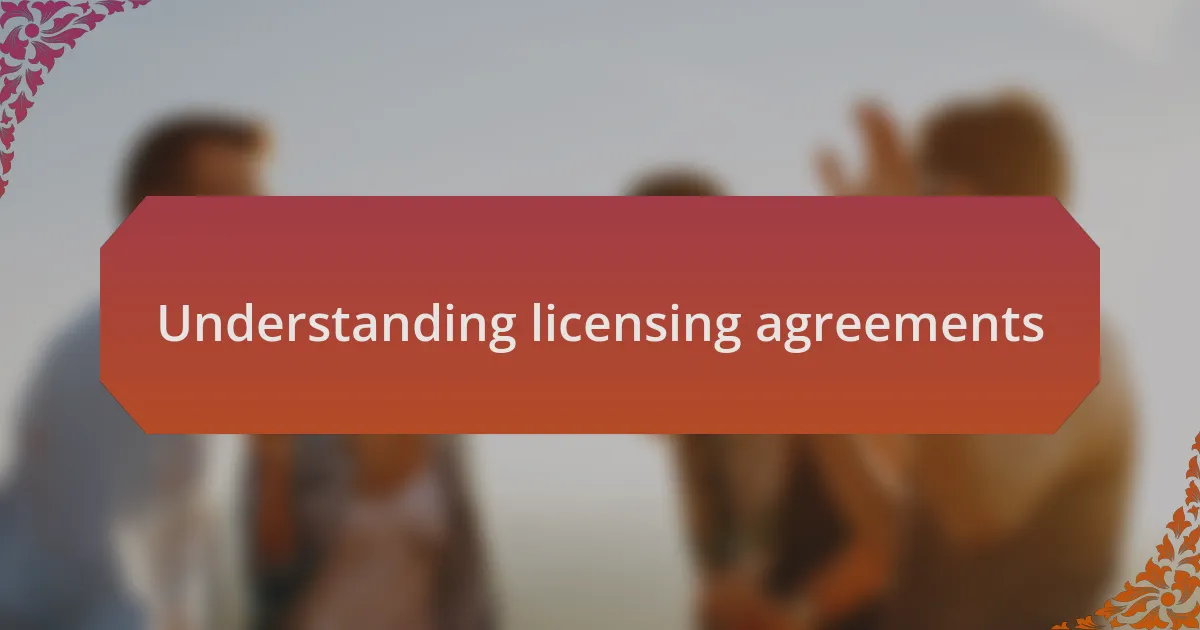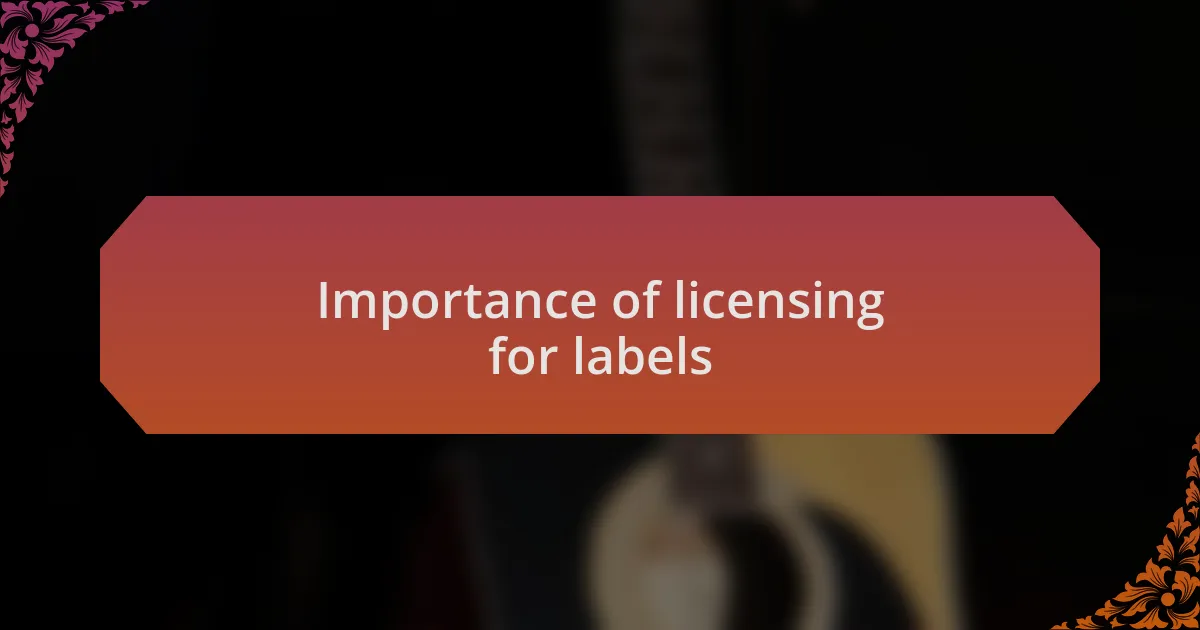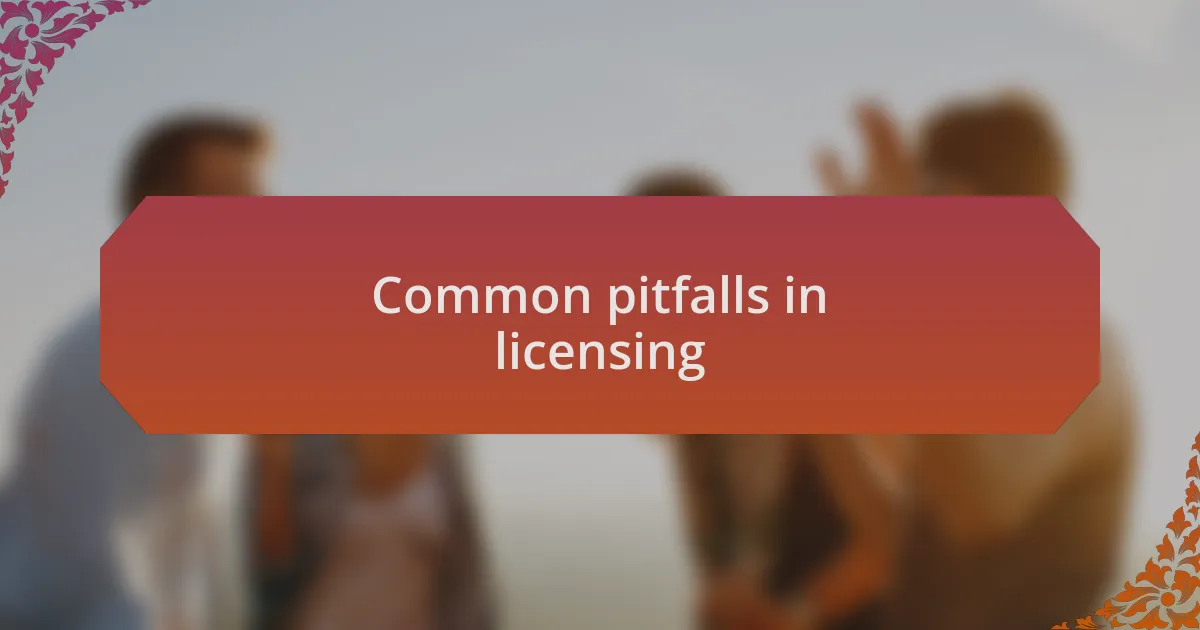Key takeaways:
- Understanding different types of licensing agreements (master, sync, mechanical) is essential for maximizing revenue and protecting artists’ rights.
- Clear communication and written agreements are crucial to avoid misunderstandings and potential disputes in licensing deals.
- Being aware of market standards and maintaining flexibility during negotiations can lead to better outcomes and successful partnerships.
- Utilizing legal advice is important to ensure that licensing agreements are favorable and protect the interests of both labels and artists.

Understanding licensing agreements
Licensing agreements can be a bit overwhelming, especially when you’re navigating the music industry as an independent label. I remember the first time I encountered one; it felt like unraveling a complicated puzzle. Each clause seemed to detach from the next, leaving me to wonder, how do I truly protect my artists and my interests?
These agreements essentially grant permission for a party to use intellectual property—like a song or a logo—under specific terms. I often find myself asking, what makes a licensing agreement beneficial? It’s crucial to ensure that both the creator and the licensee are clear on how the music will be used, how profits will be shared, and what rights are retained. Personal experiences have taught me that transparent communication during this process can save a lot of potential grief later on.
One of the most eye-opening moments for me was when I realized that not all licensing agreements are the same. From sync licenses for film and TV to mechanical licenses for physical copies, each type caters to different needs. Thinking about the various scenarios, I often wonder how artists choose the best approach. Understanding the nuances can greatly impact how a label and its artists monetize their work, creating opportunities that align with each party’s vision.

Importance of licensing for labels
The importance of licensing for labels cannot be overstated, as it serves as the backbone for revenue generation. I recall a time when I secured a licensing deal that allowed one of my artists’ tracks to be featured in a popular streaming commercial. It was an exhilarating moment, filled with the promise of exposure and income, highlighting how proper licensing can open doors to new audiences and financial streams.
Moreover, licensing protects the label’s and artist’s rights. I remember negotiating a deal that ensured my artist retained ownership of their master recordings while still allowing the label to profit from their music. This experience reinforced my belief in the importance of crafting agreements that not only serve immediate goals but also safeguard long-term interests. What happens if a licensing deal lacks clarity? Confusion can lead to disputes down the line, and based on my experience, a poorly defined agreement can become a costly headache.
Finally, licensing plays a crucial role in establishing your label’s credibility and industry standing. When I first started, I noticed that labels with well-structured licensing agreements were more likely to gain respect and partnerships within the industry. It made me reflect on how essential it is for labels to be proactive and knowledgeable about licensing. Without it, a label risks losing opportunities that could elevate its artists and brand in a competitive marketplace.

Types of licensing agreements
When it comes to licensing agreements, there are several types that labels may encounter. For instance, a master license allows a label to control the use of the underlying sound recordings. I remember my excitement when I first secured this type of license for an indie band; it felt empowering knowing that we could manage how and where their music would be utilized, from commercials to film scores.
Another prominent type is the synchronization (sync) license, which permits music to be paired with visual media, like movies and TV shows. I once had a heartwarming experience collaborating with a filmmaker who wanted to feature one of our tracks in an emotional scene. It was incredible to see how our music enriched the storytelling, making me appreciate the profound impact that a well-crafted sync license can have on both the artist’s reach and the creative work at hand.
A third important agreement is the mechanical license, which grants the right to reproduce and distribute music in physical formats or digital downloads. I view this as a fundamental element for any label aiming to generate consistent revenue. Reflecting on my journey, I can’t stress enough the value of securing solid mechanical licensing; it ensures that the artists are compensated fairly while allowing their music to circulate freely in a digital age where accessibility is key. What has your experience been with these various types of agreements? I assure you, understanding them is invaluable for any upcoming label.

Common pitfalls in licensing
One of the most common pitfalls in licensing is overlooking the specific rights involved in an agreement. I remember a pivotal moment when I rushed into a licensing deal and realized later that we had granted more rights than intended, impacting the artist’s control over their own work. It’s crucial to meticulously analyze each element of the contract to avoid inadvertently giving away too much.
Another frequent mistake is neglecting to specify the duration and territory of the license. In one instance, I entered an agreement that allowed the use of a song in Europe, but the licensing didn’t clarify the time frame. This ambiguity later led to disputes that could have been easily avoided with clear terms. Are you taking enough care with these details? Believe me, clarity can prevent unnecessary headaches down the line.
Lastly, many emerging labels underutilize legal advice in the licensing process. I’ve seen firsthand how agencies focus on quick deals for short-term gains, often at the expense of long-term relationships and revenue. A licensed expert can provide invaluable insight, ensuring agreements protect the label’s interests while respecting the artists. Why risk it when the right guidance can provide peace of mind and foster successful partnerships?

My personal experiences with licensing
Navigating the world of licensing agreements has often felt like a double-edged sword for me. I vividly recall a time when I secured a license that seemed beneficial at first glance, only to realize later that the royalty rates were far less favorable than industry standards. It taught me a valuable lesson about the importance of due diligence and negotiation in every step of the process.
One memorable experience involved licensing a beloved track from a renowned artist. I was excited about the project, but I learned that not all songs come with clear-cut rights. The convoluted nature of rights ownership meant I had to reach out to multiple parties just to get everything squared away. How many times have I wished for a straightforward agreement? I’ve come to appreciate that clarity in communication is just as vital as the contract itself.
I also had an eye-opening encounter while working on a collaborative project with another label. We decided to pool resources for a joint licensing deal, but our differing visions caused a series of frustrating misalignments. The tension evolved into an impasse over the direction of the project. It made me reflect on how essential it is to have aligned goals before entering any licensing conversations. What’s the point of a partnership if both sides aren’t on the same page? This experience reinforced my belief that establishing a strong foundation—built on mutual respect and understanding—can make all the difference in successful licensing.

Tips for successful licensing agreements
One crucial tip I’ve learned is to always get everything in writing. I remember a licensing deal that felt great verbally, but when it came time to finalize, the other party had a different understanding of our agreement. It was maddening! Establishing clear terms on paper avoids misunderstandings and sets a solid foundation for collaboration. Have you ever faced such a situation? It can really hinder trust if you’re not careful.
Another strategy that has served me well is being aware of the market standards before negotiating terms. I once entered a negotiation feeling underprepared and left with less favorable conditions than I intended. Knowing what similar artists or labels typically offer in the same genre can give you a significant advantage. This knowledge not only empowers me but also shows that I respect the value of my work.
Lastly, I can’t stress enough the importance of flexibility in negotiations. Early on, I was rigid about certain terms, thinking it would strengthen my position. However, I’ve come to realize that being open to compromise can lead to more fruitful partnerships in the long run. After all, isn’t the ultimate goal to create something amazing that benefits everyone involved? I always find that a little give-and-take fosters an environment of collaboration and innovation.